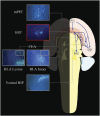Compensation in the neural circuitry of fear conditioning awakens learning circuits in the bed nuclei of the stria terminalis
- PMID: 20679237
- PMCID: PMC2930410
- DOI: 10.1073/pnas.1005754107
Compensation in the neural circuitry of fear conditioning awakens learning circuits in the bed nuclei of the stria terminalis
Abstract
The basolateral amygdala (BLA) is thought to be essential for fear learning. However, extensive training can overcome the loss of conditional fear evident following lesions and inactivation of the BLA. Such results suggest the existence of a primary BLA-dependent and a compensatory BLA-independent neural circuit. We tested the hypothesis that the bed nuclei of the stria terminalis (BST) provides this compensatory plasticity. Using extensive context-fear conditioning, we demonstrate that combined BLA and BST lesions prevented fear acquisition and expression. Additionally, protein synthesis in the BST was critical only for consolidation of BLA-independent but not BLA-dependent fear. Moreover, fear acquired after BLA lesions resulted in greater activation of BST regions that receive hippocampal efferents. These results suggest that the BST is capable of functioning as a compensatory site in the acquisition and consolidation of context-fear memories. Unlocking such neural compensation holds promise for understanding situations when brain damage impairs normal function or failure to regulate compensatory sites leads to anxiety disorders.
Conflict of interest statement
The authors declare no conflict of interest.
Figures







References
-
- Squire LR. Memory systems of the brain: A brief history and current perspective. Neurobiol Learn Mem. 2004;82:171–177. - PubMed
-
- Kim JJ, Fanselow MS. Modality-specific retrograde amnesia of fear. Science. 1992;256:675–677. - PubMed
-
- McDonald RJ, White NM. A triple dissociation of memory systems: Hippocampus, amygdala, and dorsal striatum. Behav Neurosci. 1993;107:3–22. - PubMed
-
- Kim M, Davis M. Electrolytic lesions of the amygdala block acquisition and expression of fear-potentiated startle even with extensive training but do not prevent reacquisition. Behav Neurosci. 1993;107:580–595. - PubMed
Publication types
MeSH terms
Substances
Grants and funding
LinkOut - more resources
Full Text Sources

